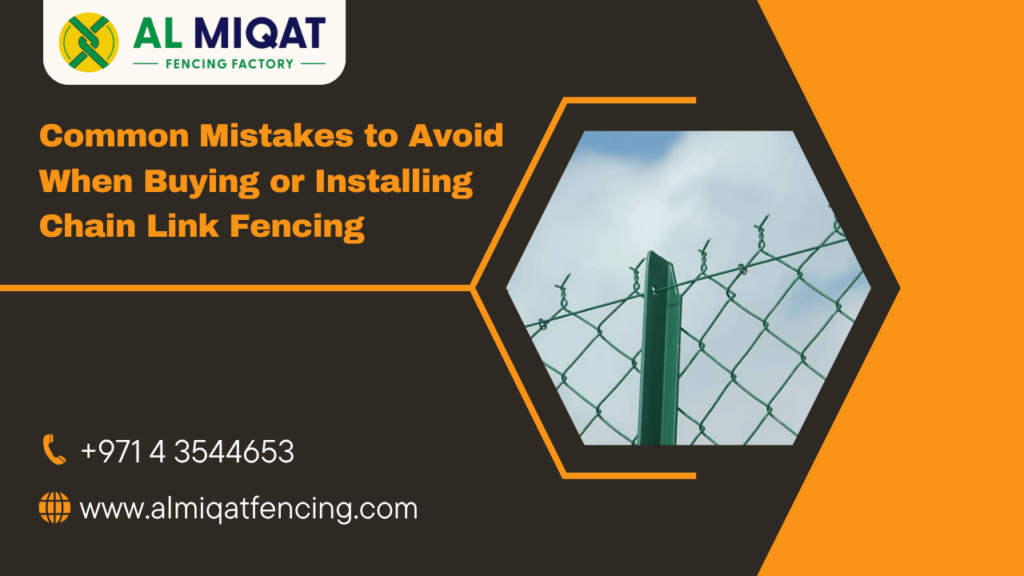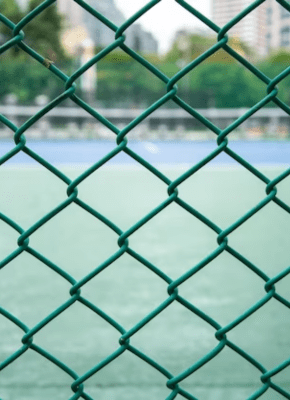Al Miqat Fencing Factory is a trusted manufacturer and supplier of high-quality fencing solutions, including chain link fencing, welded mesh, barbed wire, shade netting, and wire mesh products. With a strong focus on durability, value, and expert service, we support clients across construction, agriculture, industrial, and residential sectors. Whether you need fencing for security, partitioning, or protection, we deliver products that last—built to perform in even the harshest environments.
Introduction
Chain link fencing is one of the most popular and cost-effective choices for securing property, defining boundaries, or enclosing spaces. Known for its durability, affordability, and ease of installation, chain link fences are used in residential plots, schools, factories, sports grounds, farms, and commercial zones.
However, while chain link fencing may seem simple, mistakes during purchase or installation can lead to poor performance, safety issues, or unnecessary expenses. From choosing the wrong material to installing without proper tension, these common errors can shorten the lifespan of your fence and compromise its effectiveness.
In this blog, we’ll explore the most frequent mistakes people make when buying or installing chain link fencing, and how to avoid them—ensuring your investment is secure and long-lasting.
1. Choosing the Wrong Gauge or Mesh Size
One of the most overlooked decisions is selecting the correct wire gauge and mesh size. Gauge refers to the wire thickness, while mesh size is the space between wires.
Common mistake: Selecting a light-duty gauge (e.g., 16 or 18) when the fence needs to withstand impact or heavy use. Likewise, using too large a mesh size can allow animals or intruders to get through.
How to avoid it:
Choose a thicker wire gauge (e.g., 8 or 10) for high-security or heavy-duty applications. For residential or garden use, 12–14 gauge may suffice. Always consider the purpose and expected wear and tear before deciding.
2. Ignoring Coating and Corrosion Resistance
Chain link fences are often exposed to sun, rain, humidity, or industrial pollution, all of which can cause rust if the material isn’t protected.
Common mistake: Buying bare steel fencing without galvanization or PVC coating, especially for outdoor applications.
How to avoid it:
For outdoor or long-term use, always choose galvanized or PVC-coated chain link fencing. PVC coating adds an extra layer of protection and aesthetic value. At Al Miqat Fencing Factory, we offer high-quality coatings that extend fence life and resist harsh weather.
3. Poor Quality or Inadequate Posts
Fence posts are the backbone of your chain link system. Even if the mesh is strong, a fence with weak or improperly installed posts will eventually fail.
Common mistake: Using undersized, rust-prone, or poorly anchored posts that bend, lean, or collapse over time.
How to avoid it:
Use heavy-duty galvanized steel posts, sized appropriately for the height and weight of your fence. Posts should be firmly anchored in concrete footings, especially at corners and gates.
4. Incorrect Post Spacing
The stability of a chain link fence depends heavily on correct post spacing. Posts that are too far apart allow the mesh to sag or become loose over time.
Common mistake: Spacing posts too far apart to save costs, compromising structural integrity.
How to avoid it:
The general recommendation is to space line posts no more than 10 feet (3 meters) apart. For windy areas or taller fences, closer spacing is recommended. Corner, end, and gate posts should be stronger and more deeply anchored.
5. Not Applying Proper Tension
Tension is critical to a clean, straight, and durable chain link fence. Without it, the mesh will sag or ripple, reducing both appearance and function.
Common mistake: Installing chain link mesh without using tension bars and tension bands, leading to a loose or unstable fence.
How to avoid it:
Always use tension bars at ends and corners, along with tension wire at the top and/or bottom. These components keep the mesh tight and prevent sagging. Stretch the mesh properly during installation for a clean, firm finish.
6. Skipping Bottom Rail or Wire
Many people overlook the bottom section of the fence, assuming gravity will do the job. However, without a bottom rail or wire, the fence is vulnerable to:
- Animals digging underneath
- Mesh curling upwards
- Structural weakness over time
Common mistake: Not securing the bottom edge of the mesh.
How to avoid it:
Add a bottom tension wire or rail to anchor the mesh and discourage movement or tampering. This is especially important in areas with pets, wildlife, or high winds.
7. Overlooking Gates and Access Points
Gates are more than just an entry point—they are often the most used and most vulnerable parts of the fence.
Common mistake: Choosing poor quality gates or not reinforcing gate posts properly. This leads to sagging or misalignment over time.
How to avoid it:
Use heavier gauge material for gates and reinforce gate posts with extra concrete or support. Always install high-quality hinges and latches for long-term functionality.
8. DIY Without the Right Tools or Knowledge
Installing a chain link fence may seem straightforward, but professional tools and knowledge can make a big difference in quality and durability.
Common mistake: Attempting a DIY installation without proper training or equipment, leading to uneven mesh, weak tension, or misaligned posts.
How to avoid it:
If you’re not experienced with fencing work, consult a professional. Al Miqat Fencing Factory can provide installation support, product guidance, or connect you with reliable installers to ensure a trouble-free experience.
Conclusion
Chain link fencing is a smart and economical solution for securing and enclosing spaces—but only when installed and maintained correctly. By avoiding common mistakes like choosing the wrong gauge, neglecting coatings, or skimping on installation quality, you can ensure that your fence performs effectively for years.
At Al Miqat Fencing Factory, we not only supply high-quality chain link fencing in various gauges, heights, and coatings, but we also provide expert advice to help you avoid costly errors. Whether you’re securing a home, a warehouse, a farm, or a sports facility, we have the right fencing solution to meet your needs.
Contact us today to learn more about our products, request a quote, or get help with your fencing project. With Al Miqat, you get more than a fence—you get peace of mind built into every meter.


